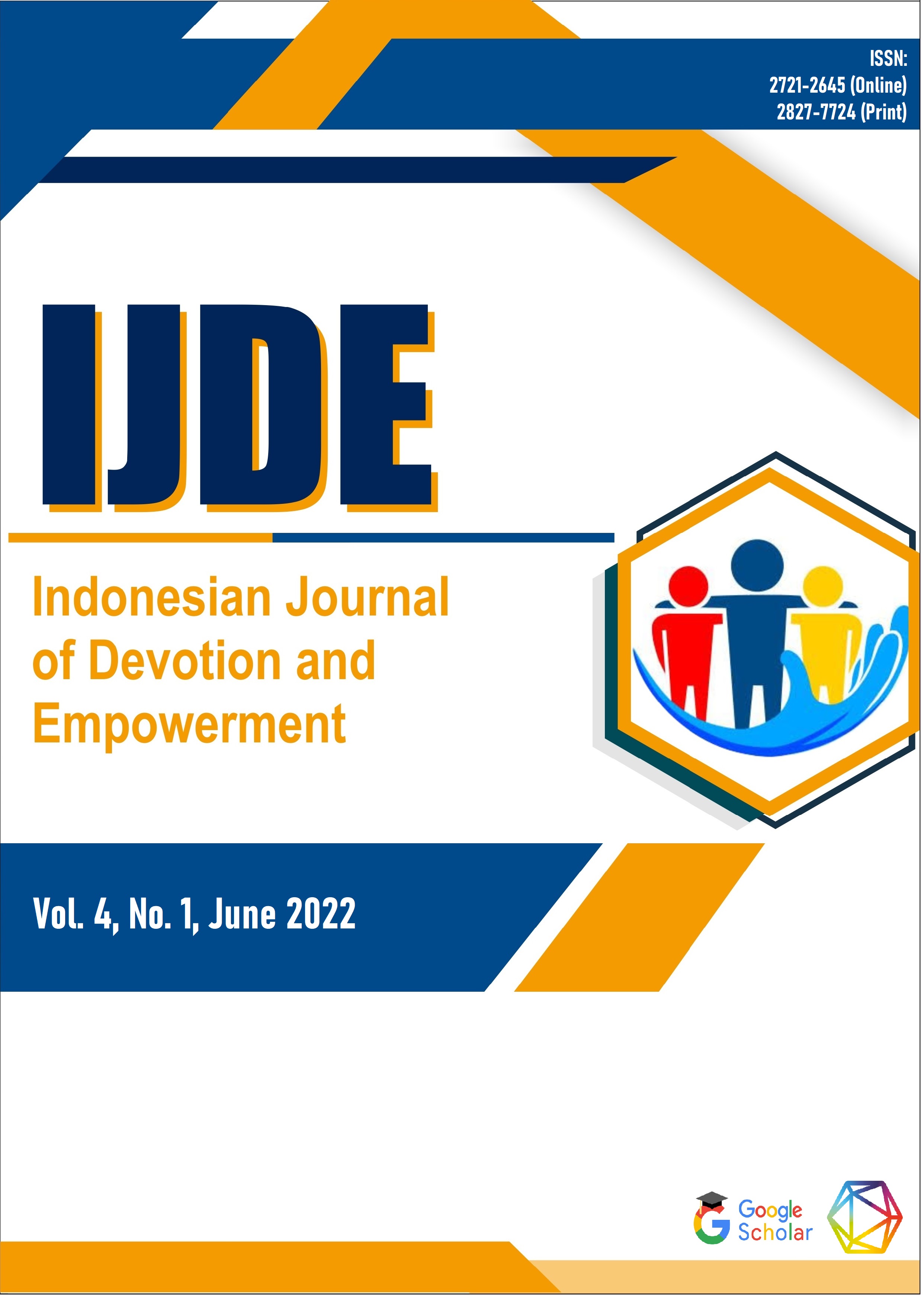Financial Digitization using SILARUM Integrated in the Batik Talangsari Cluster, Semarang City
##plugins.themes.academic_pro.article.main##
Abstract
Most MSME actors cannot provide accounting information related to their business conditions. It is motivated by several things, such as the view of MSME actors that accounting practice is difficult. In addition, other obstacles are the educational background that does not understand accounting or bookkeeping and the lack of sufficient funds to hire accountants or buy accounting software. Therefore, there is a need for an accessible and integrated accounting bookkeeping innovation, one of which is in the Batik Cluster of Semarang City. The SMEs in the Semarang City Batik Cluster is part of the Regional Development Planning Agency (PEL) of Semarang City in 2021. The cluster members are 30 SMEs with an average workforce of 64 people. The batik cluster received training from various universities and trainers in collaboration with Bappeda Semarang, such as textile product training and paper stamped batik training. Not only that but accounting training is also provided in an application called SILARUM. This training is expected to be a solution for SMEs actors in making financial reports quickly, even though MSME actors do not have basic accounting. SILARUM is an integrated accounting application system capable of producing financial reports, namely statements of financial position, income statements, reports of changes, and reports of cash flows. The SILARUM system has a broader scope because it provides a cash flow report output.
Mayoritas pelaku UMKM tidak mampu memberikan informasi akuntansi terkait kondisi usahanya. Hal ini dilatarbelakangi oleh beberapa hal seperti pandangan pelaku UMKM bahwa praktik akuntansi merupakan hal yang sulit. Disamping itu, kendala lain adalah latar belakang pendidikan yang tidak paham akuntansi atau tata buku, tidak adanya dana yang cukup untuk mempekerjakan akuntan atau membeli software akuntansi. Oleh karena itulah perlu adanya inovasi pembukuan akuntansi yang mudah dan terintegrasi salah satunya di Klaster Batik Kota Semarang. UMKM Klaster Batik Kota Semarang tersebut tergabung dalam PEL (Pengembangan Ekonomi Lokal) Bappeda Kota Semarang tahun 2021. Anggota klaster terdiri dari 30 UMKM dan memiliki rata-rata tenaga kerja sebanyak 64 orang. Klaster batik mendapatkan pelatihan dari berbagai perguruan tinggi maupun para trainer yang bekerjasama dengan Bappeda Semarang, seperti pelatihan produk tekstil dan pelatihan batik cap kertas. Tidak hanya itu, pelatihan akuntasi juga diberikan dalam aplikasi bernama SILARUM. Pelatihan ini diharapkan menjadi sebuah solusi bagi pelaku UMKM dalam membuat laporan keuangan secara mudah, walaupun pelaku UMKM tidak memiliki basic akuntansi. SILARUM merupakan sistem aplikasi akuntansi terintegrasi yang mampu menghasilkan laporan keuangan, yaitu laporan posisi keuangan, laporan laba rugi, laporan perubahan dan laporan arus kas. Sistem SILARUM memiliki scope yang lebih luas, karena dilengkapi dengan output laporan arus kas.
##plugins.themes.academic_pro.article.details##
References
Aribawa, D. (2016). Pengaruh literasi keuangan terhadap kinerja dan keberlangsungan UMKM di Jawa Tengah. Jurnal Siasat Bisnis, 20(1), 1-13.
Baas, T., & Schrooten, M. (2006). Relationship banking and SMEs: A theoretical analysis. Small business economics, 27(2), 127-137.
Bellamy, L. C., Amoo, N., Mervyn, K., & Hiddlestone-Mumford, J. (2019). The use of strategy tools and frameworks by SMEs in the strategy formation process. International Journal of Organizational Analysis.
Blomkvist, M., Johansson, J., & Malmström, M. (2016). Accounting Knowledge in Innovative Firms: Direct Contacts with External Auditors for Strategic Actions. International Journal of Managerial and Financial Accounting, 8(3/4), 209-228.
Chawan, A., & Vasudevan, H. (2014). Knowledge management practices in Indian manufacturing MSMEs: challenges and opportunities. Procedia Engineering, 97, 1784-1787.
Davidsson, P. (1989). Entrepreneurship—and after? A study of growth willingness in small firms. Journal of business venturing, 4(3), 211-226.
Dewi, F., & Mahendrawathi, E. R. (2019). Business process maturity level of MSMEs in East Java, Indonesia. Procedia Computer Science, 161, 1098-1105.
Esparza-Aguilar, J. L., García-Pérez-de-Lema, D., & Duréndez, A. (2016). The effect of accounting information systems on the performance of Mexican micro, small and medium-sized family firms: An exploratory study for the hospitality sector. Tourism Economics, 22(5), 1104-1120.
Fahmi, I. (2012). Analisis kinerja keuangan: panduan bagi akademisi, manajer, dan investor untuk menilai dan menganalisis bisnis dari aspek keuangan.
Georgellis, Y., Joyce, P., & Woods, A. (2000). Entrepreneurial action, innovation and business performance: the small independent business. Journal of small business and enterprise development.
Kasmir. 2008. Analisis Laporan Keuangan. PT. Rajagrafindo Persada. Jakarta.
McLeod Jr, R., & Schell, G. P. (2008). Sistem Informasi Manajemen, Edisi 10, Terjemahan oleh Ali Akbar Yulianto dan Afia R. Fitriati, Jakarta: Salemba empat.
Peck, F., Jackson, K., & Mulvey, G. (2018). Regulation and growth-oriented small businesses in North-West England. Journal of Small Business and Enterprise Development.
Pongoh, M. (2013). Analisis Laporan Keuangan untuk Menilai Kinerja Keuangan PT. Bumi Resources Tbk. Jurnal EMBA: Jurnal Riset Ekonomi, Manajemen, Bisnis dan Akuntansi, 1(3).
Pratiwi, J. (2013). penerapan biaya standar dalam pengendalian biaya produksi pada PT. PERTANI (PERSERO) cabang Sulawesi Utara. Jurnal EMBA: Jurnal Riset Ekonomi, Manajemen, Bisnis dan Akuntansi, 1(4).
Ruiz-Palomo, D., Diéguez-Soto, J., Duréndez, A., & Santos, J. A. C. (2019). Family management and firm performance in family SMEs: The mediating roles of management control systems and technological innovation. Sustainability, 11(14), 3805.
Sari, R. P., & Santoso, D. T. (2019). Pengembangan model kesiapan umkm di era revolusi industri 4.0. Jurnal Media Teknik dan Sistem Industri, 3(1), 37-42.
Tedjasuksmana, B. (2014). Potret UMKM Indonesia menghadapi masyarakat ekonomi ASEAN 2015. In The 7th NCFB and Doctoral Colloquium (pp. 189-202).
Hutahayan, B. (2021). The relationships between market orientation, learning orientation, financial literacy, on the knowledge competence, innovation, and performance of small and medium textile industries in Java and Bali. Asia Pacific Management Review, 26(1), 39-46.
https://doi.org/10.1016/j.apmrv.2020.07.001
